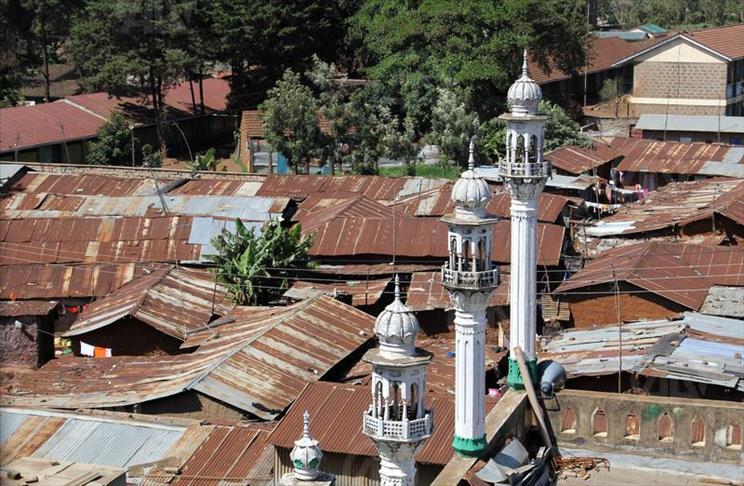Nubians still stateless in Kenya after 150 years
Nubians who were brought from Sudan by the British to fight in the colonial army, are still fighting for basic citizenship and property rights after living in Kenya for five generations.

By Ahmet Sait Akcay
NAIROBI
As Kenyans celebrate fifty years of independence from British rule, Sudanese settlers in Nairobi - the Nubians - still do not have basic citizenship rights after living in Kenya for five generations.
Most of Kenya's 100,000 Nubians live in one of the most populated places on earth - Africa's largest slum, a place called Kibera (from the Nubian word “Kibra,” for forest).
Nubian soldiers and their families who worked for the British colonial army around a century ago, were the original settlers of Kibera. But they never actually owned the land in any formal way, and today the government still refuses to grant Nubians title deeds for plots they have lived on for generations.
Over the past few years a wave of other Kenyans has moved into Kibera, so Nubians make up only a small percentage of the population, and they still don’t have a formal “homeland”—something closely linked to citizenship across Africa
Nubians are considered squatters in Kibera - a place between one and two million people call home.
Now the Nubians face eviction by the Kenyan government, seeking to ‘upgrade’ the slums and who refuse to recognize the Nubians' rights to the area.
Nubian's were originally brought by the British from Sudan in the 1850's to fight in the colonial army.
Referred to as “king’s soldiers” during the colonial times, the Nubians were loyal to the British until 1950, when the independence struggle started. Despite their loyalty during the colonial period, it was the British initially that prevented the Nubians from being educated out of fear that they would agitate for their rights, says Ibrahim Athman, vice chairman of the Kenyan Nubian Council.
"The Nubian soldiers, known for their bravery and loyalty, were used by the British. They in return refused the Nubians their right to education. The Nubians could only get educated to a certain degree in order to understand their commands.”
“Everything indicates that this is our land, Nubian land, our indigenous homeland. Other tribes have their rural homes, but we don’t. This is our domicile of the last resort,” says Issa Abdul Faraj, the chairman of the Kenyan Nubian Council.
However, he said, they believed in the philosophy of “live and let live”. “While we are claiming our land here, we welcome other people to join hands with us in peaceful coexistence, in unity, in diversity with others.”
During Africa's fight for Independence, the Nubians respected the African struggle for independence and refused to join forces with the British. They even resigned from their jobs to show their support for their fellow Africans, says Athman.
"As a result of that the British refused to translate Shamba passes (sort of temporary title deed) into title deeds, because the Nubians sided with the Kenyans," reveals Athman.
“They (British) are very familiar with the land issue, the debates. But I haven’t heard even the British representative in Kenya, the British High Commissioner. He should have come out and said something about it” said Athman, urging authorities to treat the question properly.
With the release of Kenya's first president Jomo Kenyatta in 1961, the Nubians lost their sites during the Mau Mau uprising which took place between 1952 and 1960.
After Kenya acquired its independence, only a few of them obtained their IDs and their struggle against discrimination and statelessness has been ignored by the authorities ever since.
Between 1963 and 2007 Nubians' position took a turn for the worse. The continuing struggle since the 19th century for security of tenure for their property in Kibra was pushed aside by a Ministry of Housing upgrading project which resulted in most Nubians becoming homeless, stateless, and landless because they could not afford the hefty financial cost imposed on them.
In 1997 inter-ethnic clashes between Nubians and other Kenyan tribes, who came to settle in Kibera, began and several people lost their lives and property when Nubian houses were razed to the ground and some houses were occupied.
"Despite the contribution of Nubians to Kenyan Independence, the successive Kenyan governments have refused to honor their claim for this land and failed to recognize the role that we played in the attainment of independence," Atham says. "Even though President Uhuru seeks solutions, the Nubian Community still hungers for their title deeds which would be the biggest justice the government can every do for them", he summarizes.
englishnews@aa.com.tr
Anadolu Agency website contains only a portion of the news stories offered to subscribers in the AA News Broadcasting System (HAS), and in summarized form. Please contact us for subscription options.

